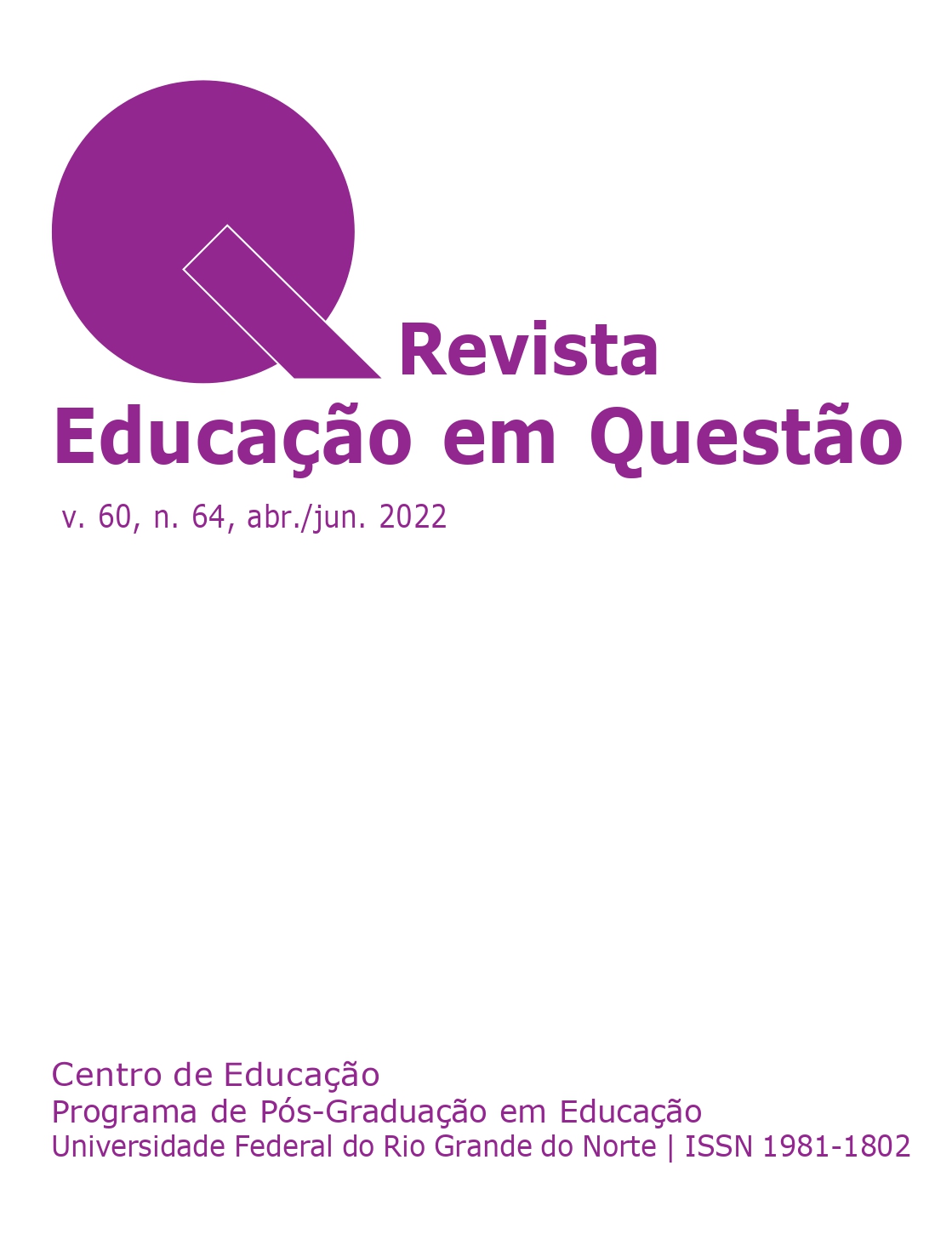The Others at school and the school of the Others
contestations of the education coloniality
DOI:
https://doi.org/10.21680/1981-1802.2022v60n63ID28737Keywords:
Anticolonial education, School decolonization, Anti-colonial theories, School educationAbstract
Based on the analysis of data from a doctoral investigation (Author, year) and in dialogue with Torto Arado, Itamar Vieira Juniors’ work (2019), in this article we intend to analyze the cracks in the coloniality of education caused by the resistants and insurgents presences of subjects made Others at school. This is reflection a sustained on anti-colonial perspectives that allow us to denounce the historical and contemporary alignment between formal education and the colonial project, while also announcing the need and feasibility of school decolonization. From this perspective, in the present text, the testimonies of the subjects of investigation that, to some extent, are convergent to the school experience of one of the protagonists of Torto Arado (Vieira-Júnior, 2019), Belonísia, lead us to conclude that, from an emancipatory perspective, it is imperative and urgent that school education be decolonized and, therefore, transformed based on the recognition of other subjects, of their knowledge and cultures.
Downloads
References
ANA. Entrevista. Belo Horizonte (Minas Gerais), 9 nov. 2017.
ANTÔNIO. Entrevista. Belo Horizonte (Minas Gerais), 6 dez. 2017.
ARROYO, Miguel González. Outros sujeitos, outras pedagogias. 1. ed., Petrópolis: Vozes, 2012.
ARROYO, Miguel G. O humano é viável? É educável? Revista Pedagógica, Chapecó, v. 17, n. 35, p. 21-40, mai./ago. 2015.
BOURDIEU, Pierre. Futuro de classe e causalidade do provável. In: NOGUEIRA, Maria Alice; CATANI, Afrânio Mendes (org.). Escritos de educação. Petrópolis, RJ: Vozes, 1998.
BRASIL. Casa Civil. Lei 11.645 de 10 de março de 2008. Altera a Lei no 9.394, de 20 de dezembro de 1996, modificada pela Lei no 10.639, de 9 de janeiro de 2003, que estabelece as diretrizes e bases da educação nacional, para incluir no currículo oficial da rede de ensino a obrigatoriedade da temática “História e Cultura Afro-Brasileira e Indígena”. Disponível em: http://www.planalto.gov.br/ccivil_03/_ato2007-2010/2008/lei/l11645.htm Acesso em: 30 mar. 2022.
CARNEIRO, Aparecida Sueli. A construção do outro como não-ser como fundamento do ser . 2005. 339 f. (Tese de Doutorado) - Programa de Pós-Graduação em Educação da Universidade de São Paulo. São Paulo, 2005.
CECÍLIA. Entrevista. Belo Horizonte (Minas Gerais), 22 nov. 2017.
DÉBORA. Entrevista. Belo Horizonte (Minas Gerais), 23 nov. 2017.
EDUARDO. Entrevista. Belo Horizonte (Minas Gerais), 15 dez. 2017.
FANON, Frantz. Os condenados da terra. São Paulo: Civilização Brasileira, 1968.
FREIRE, Paulo. Pedagogia do oprimido. Porto: Afrontamento, 1974.
FREIRE, Paulo. Pedagogia da esperança: um reencontro com a Pedagogia do Oprimido. São Paulo: Paz e Terra, 1992.
FREIRE, Paulo. Pedagogia da autonomia: saberes necessários à prática educativa. São Paulo: Paz e Terra, 1996.
FREIRE, Paulo. Pedagogia da indignação: cartas pedagógicas e outros escritos. São Paulo: UNESP, 2000.
HELENA. Entrevista. Belo Horizonte (Minas Gerais), 7 nov. 2017.
HOOKS, Bell. Ensinando a transgredir: A educação como prática da liberdade. São Paulo: Martins Fontes, 2013.
LOURO, Guacira Lopes. Gênero, sexualidade e educação. Uma perspectiva pós estruturalista. Petrópolis: Vozes, 1997.
LUGONES, MARÍA. Colonialidad y Género. Tabula Rasa, Bogotá , n. 9, p. 73-102, Dec. 2008.
LUIZA. Entrevista. Belo Horizonte (Minas Gerais), 2 dez. 2017.
MANUELA. Entrevista. Belo Horizonte (Minas Gerais), 17 nov. 2017
MARIA. Entrevista. Belo Horizonte (Minas Gerais), 06 fev. 2018.
MIGNOLO, Walter. Local histories/global designs: coloniality, subaltern knowledges and border thinking. Princeton: Princeton University Press, 2000.
MISKOLCI, Richard. (org.) Marcas da Diferença no Ensino Escolar. São Carlos: EdUFSCar, 2010.
PARADA, Miguel Bazdresch.B. Educación y pobreza: una relación conflictiva. In: ZICCARDI, Ana. (comp.). Pobreza, desigualdad social y ciudadanía: los limites de las políticas sociales en América Latina. Buenos Aires: CLACSO, 2001.
QUIJANO, Aníbal. Colonialidade do poder, eurocentrismo e América Latina. In: LANDER, E. (ed.). A colonialidade do saber: eurocentrismo e ciências sociais. Buenos Aires: CLACSO, 2005.
ROSEMBERG, Fúlvia. ; MADSEN, Nina. Educação formal, mulheres e gênero no Brasil contemporâneo. In: BARSTED, Leila Linhares.; PITANGUY, Jacqueline (org.). O progresso das mulheres no Brasil 2003-2010. Rio de Janeiro/Brasília: Peia/Unesco, 2011.
SANTOS, Boaventura de Sousa. Do pós-moderno ao pós colonial. Travessias – Revista de Ciências Sociais e Humanas em Língua Portuguesa, Coimbra, v.6, n.7, p. 15-36, 2008.
SANTOS, Boaventura de Sousa. Para uma sociologia das ausências e uma sociologia das emergências. In: SANTOS, Boaventura de Sousa (org). Conhecimento prudente para uma vida decente: Um discurso sobre as ciências revisitado. Porto: Afrontamento, 2006.
SPIVAK, Gayatri Chakravorty. Pode o subalterno falar? Belo Horizonte: UFMG, 2010.
TADEU. Entrevista. Belo Horizonte (Minas Gerais), 28 nov. 2017.
VIANA, Maria José Braga. Longevidade escolar em famílias de camadas populares: algumas condições de possibiliade. Goiânia: UCG - Editora da Universidade Católica de Goiás, 2007..
VIEIRA-JÚNIOR, Itamar. Torto Arado. São Paulo: Todavia, 2019.
WALSH, Catherine. Fanon y la pedagogia de-colonial. Novamérica, Rio de Janeiro, v. 1, n. 122, p. 60-63, jun. 2009.
WALSH, Catherine. Entretejiendo lo pedagógico y lo decolonial: Luchas, caminos y siembras de reflexión-acción para resistir, (re)existir y (re)vivir. Columbus: Alternativas, 2017.
Downloads
Published
How to Cite
Issue
Section
License
Copyright (c) 2022 Revista Educação em Questão

This work is licensed under a Creative Commons Attribution-NonCommercial-ShareAlike 4.0 International License.
The Journal Education in Question shall retain the copyright in all articles that it publishes.
The authors and co-authors of articles and book reviews, published in the Journal Education in Question, shall wait for at least 1 (one) year before they are allowed to submit new works for publication.






